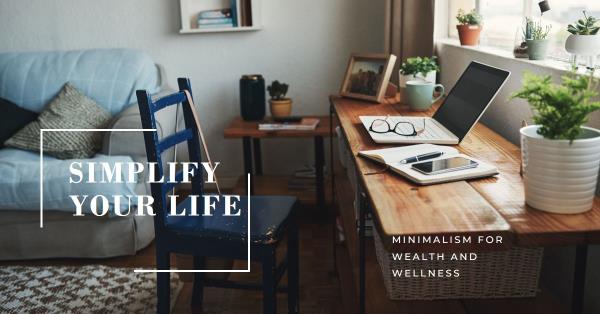In today’s world, many of us feel overwhelmed by the constant pressure to do more, buy more, and have more. Whether it’s clutter in our homes or the never-ending quest for financial success, this pursuit of “more” can lead to stress, anxiety, and even burnout. That’s where minimalism comes in.
Minimalism is a lifestyle that encourages people to simplify their lives by focusing on what truly matters and removing excess clutter—both physical and mental. The idea is simple: by having less, you make room for more important things, like health, happiness, and financial security. In this article, we’ll explore how minimalism can improve both your wealth and wellness, and how simplifying your life can lead to maximum results.
What Is Minimalism?
Minimalism is not about living with as little as possible or depriving yourself of things you enjoy. It’s about living more intentionally, making choices that align with your values, and focusing on what brings true happiness and fulfillment. This means cutting out the unnecessary—whether it’s excess possessions, time-wasting activities, or bad habits—so that you can invest your energy and resources in the things that really matter.
In terms of wealth, minimalism helps you save money, reduce debt, and build financial security by prioritizing needs over wants. On the wellness side, minimalism promotes mental clarity, reduces stress, and encourages a balanced, healthy lifestyle.
Now, let’s explore how minimalism can improve both your wealth and your well-being.
1. Reduce Financial Stress by Cutting Unnecessary Spending
One of the most immediate benefits of minimalism is that it helps you cut unnecessary expenses. We live in a consumer-driven world where we are constantly encouraged to buy more—whether it’s the latest gadgets, fashion, or trendy experiences. These purchases can quickly add up, creating financial stress, especially if you’re living paycheck to paycheck or relying on credit cards.
By adopting a minimalist mindset, you become more intentional about what you spend your money on. You learn to distinguish between your needs and wants. For example, instead of upgrading your phone every year, you might realize that your current phone works perfectly fine. This shift in thinking can help you save hundreds or even thousands of dollars annually.
Over time, cutting out unnecessary spending can reduce debt and free up money to save or invest, giving you greater financial security and peace of mind.
2. Boost Your Savings and Investments
Minimalism encourages you to focus on what truly matters, and when it comes to finances, this often means prioritizing long-term goals like saving and investing. When you’re not spending money on things you don’t need, you can redirect those funds toward building wealth.
Imagine what you could achieve if you started putting the money you usually spend on impulse purchases into a savings account or investment fund. Even small amounts can grow significantly over time, thanks to compound interest. Minimalism doesn’t just help you save money; it helps you use your money in ways that support your future financial well-being.
For example, by cutting down on unnecessary expenses, you might find it easier to build an emergency fund, which can reduce financial stress and provide a safety net in case of unexpected expenses. Alternatively, you could use the extra money to invest in stocks, real estate, or a retirement fund, all of which can help you grow your wealth over the long term.
3. Declutter Your Space for a Healthier Mindset
Clutter isn’t just physical; it’s mental too. When your home or workspace is cluttered, it can be hard to focus and stay organized, which leads to stress and anxiety. Minimalism encourages you to declutter your environment, creating a more peaceful and efficient space to live and work in.
Decluttering doesn’t mean throwing everything away; it means keeping only the things that serve a purpose or bring you joy. When you get rid of the excess, you create a calmer, more functional environment. This helps reduce the mental load of having too much stuff to manage, which in turn improves your mental clarity and reduces stress.
Studies have shown that clean, organized spaces can improve focus, productivity, and overall well-being. When your surroundings are simplified, your mind feels clearer, and you’re better able to focus on what matters—whether it’s work, relationships, or personal goals.
4. Improve Your Mental Wellness by Letting Go of Excess
Just as we accumulate physical clutter, we often carry around mental clutter—negative thoughts, worries, or emotional baggage. Minimalism teaches us to let go of things that don’t serve us, and this applies to our mental and emotional lives as well.
Practicing minimalism can help you identify and release toxic habits or negative thought patterns. For example, if you’re constantly worrying about keeping up with the latest trends or comparing yourself to others, minimalism encourages you to let go of those pressures and focus on what makes you truly happy. This shift in mindset can lead to greater emotional freedom, less anxiety, and a more positive outlook on life.
Additionally, minimalism promotes mindfulness, which is the practice of being present and fully engaged in the moment. By focusing on what’s truly important, you can stop worrying about what you don’t have or what others are doing, and instead, appreciate the simplicity and abundance in your own life.
5. Free Up Time for Things You Love
Minimalism is about more than just decluttering your home and finances; it’s also about simplifying your schedule and commitments. Many of us are constantly busy, but how much of that time is spent on things we actually enjoy or that bring value to our lives?
By adopting a minimalist lifestyle, you can free up time by cutting out activities and obligations that don’t align with your goals or values. For instance, if you’re spending hours each day scrolling through social media or watching TV, you might find that cutting back on screen time allows you to focus on hobbies, self-care, or quality time with loved ones.
Simplifying your schedule helps you become more intentional with your time. It also allows for more rest and relaxation, which is essential for maintaining good mental and physical health.
6. Focus on Quality, Not Quantity
Minimalism encourages you to focus on quality over quantity. Instead of owning a lot of cheap, disposable items, minimalists prefer to invest in high-quality products that last longer and provide more value. This applies to everything from clothing to household items.
For example, buying one high-quality pair of shoes that lasts for years is a better investment than buying several cheap pairs that wear out quickly. Similarly, investing in a few key pieces of furniture that you love and use regularly is more satisfying than filling your home with trendy but low-quality items.
This focus on quality also applies to your experiences. Rather than filling your schedule with endless activities, minimalism encourages you to prioritize meaningful experiences that bring joy and fulfillment. Whether it’s spending time with family, pursuing a passion project, or traveling to a place you’ve always wanted to visit, these experiences are often more rewarding than material possessions.
7. Align Your Life with Your Values
At its core, minimalism is about aligning your life with your values. It’s about removing the excess distractions—whether they’re physical objects, financial obligations, or time-consuming commitments—and focusing on what truly matters to you.
When you simplify your life and focus on your core values, you’ll find that both your wealth and wellness improve. Financially, you’ll be more mindful of your spending, investing in things that bring long-term value rather than short-term gratification. Mentally and emotionally, you’ll feel more at peace, knowing that your life reflects your values and goals.
For example, if one of your values is health, minimalism might inspire you to prioritize spending on nutritious food, a gym membership, or wellness activities instead of buying the latest gadgets. If family is a core value, you might focus on creating a simpler schedule that allows for more quality time with loved ones.
8. Sustainable Living for a Greener Future
Minimalism also has environmental benefits. By consuming less and making intentional purchases, you reduce waste and your overall environmental footprint. Buying fewer things means fewer resources are used in the production, packaging, and transportation of goods. Additionally, when you choose to invest in durable, high-quality products, you’re contributing to a culture of sustainability.
Living a minimalist lifestyle doesn’t just benefit your wealth and wellness; it also supports a greener, more sustainable future. It encourages you to be mindful of how your consumption habits affect the planet, helping you make choices that are better for both you and the environment.
Conclusion
Minimalism is more than just a trend; it’s a powerful lifestyle that can improve your wealth and wellness in countless ways. By simplifying your life—whether it’s reducing clutter, cutting unnecessary expenses, or freeing up time for what truly matters—you can create space for greater financial security and better mental and physical health.
At its core, minimalism is about living intentionally. It helps you focus on what brings true joy, value, and fulfillment, allowing you to live a more balanced, stress-free, and meaningful life. Whether you’re looking to improve your finances, boost your mental wellness, or simply create a more peaceful living environment, minimalism offers a path to achieving maximum results through simplicity.

